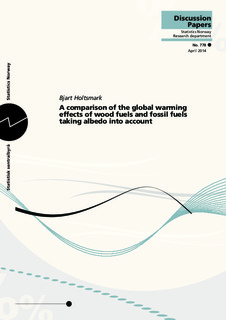| dc.description.abstract | Traditionally, wood fuels, like other bioenergy sources, have been considered carbon neutral because the amount of CO2 released can be offset by CO2 sequestration due to the regrowth of the biomass. Thus, until recently, most studies assigned a global warming potential (GWP) of zero to CO2 generated by the combustion of biomass (biogenic CO2). Moreover, emissions of biogenic CO2 are usually not included in carbon tax and emissions trading schemes. However, there is now increasing awareness of the inadequacy of this way of treating bioenergy, especially bioenergy from boreal forests. Holtsmark (2014) recently quantified the GWP of biogenic CO2 from slow-growing forests (GWPbio), finding it to be significantly higher than the GWP of fossil CO₂ when a 100-year time horizon was applied. Hence, the climate impact seems to be even higher for the combustion of slow-growing biomass than for the combustion of fossil carbon in a 100-year timeframe. The present study extends the analysis of Holtsmark (2014) in three ways. First, it includes the cooling effects of increased surface reflectivity after harvest (albedo). Second, it includes a comparison with the potential warming impact of fossil fuels, taking the CO2 emissions per unit of energy produced into account. Third, the study links the literature estimating GWPbio and the literature dealing with the carbon debt, and model simulations estimating the payback time of the carbon debt are presented. The conclusion is that, also after these extensions of the analysis, bioenergy from slow-growing forests usually has a larger climate impact in a 100-year timeframe than fossil oil and gas. Whether bioenergy performs better or worse than coal depends on a number of conditions. | nb_NO |
